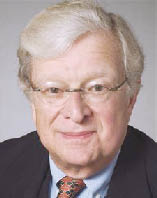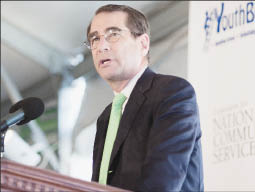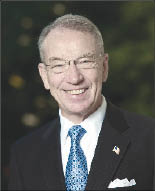While the White House orchestrated a flurry of events late last month to turn the national spotlight to public service – with first lady Michelle Obama opening the national volunteerism conference in San Francisco, cabinet members doing everything from reading to students to driving wounded veterans to their doctors’ appointments, and the president and his wife stuffing school backpacks for military children – much of the attention was stolen by a white-haired lawyer who was recently expelled from the inner circle of the national service office.
 |
|
Walpin: “They have scraped the bottom of the barrel.” |
The firing in June of Gerald Walpin from his job as inspector general for the Corporation for National and Community Service (CNCS) set off a political maelstrom and focused attention on troubles at the agency tasked with the expansion of AmeriCorps and other service initiatives.
President Barack Obama has repeatedly emphasized the value, even glory, of national and community service – hailing service in his Inaugural Address, mentioning it during numerous speeches, pushing it in public service announcements – but six months into his administration, the agency charged with leading volunteer efforts is still without a head, after his first choice dropped out. And now it’s enmeshed in a controversy that doesn’t seem likely to fade away.
Is this a metaphor for Obama’s grand plans to triple the size of AmeriCorps and sponsor innovation in the service sector? Is the Serve America bill, which breezed through Congress as a tribute to Sen. Edward Kennedy (D-Mass.), destined to be crippled by what some see as Obama’s politicization of the nation’s service sector?
Conservatives, who have long viewed the expansion of AmeriCorps as just a short step from requiring national service, or as akin to raising an energetic private army to support the socialization of America, are raising new questions about plans for a $6 billion budget for CNCS by 2017. The White House has been hit with a barrage of letters from Congress demanding answers about Walpin’s firing, evidence for the stated reasons behind it and details of the Justice Department’s involvement in the matter.
It’s an Inside-the-Beltway battle with enormous impact on the countless youth-serving agencies that depend on CNCS for money.
What It’s All About
First, a little background on the key players.
• Alan D. Solomont: The Boston philanthropist, a nurse by training, made his fortune in nursing homes and now heads SolomontBailis Ventures. Over the past decade, he and his wife, Susan Solomont, former fundraiser for WGHB TV and radio in Boston, have given almost $2.2 million to Democratic causes, according to Federal Election Commission records, which cover only federal elections. He is credited with raising $1.4 million for Obama in the Northeast.
 |
|
Solomont: Clashed with Walpin and sought his removal as inspector general. |
Solomont was first appointed to the CNCS board in 2000 by President Bill Clinton and reappointed in 2007 by President George W. Bush. He was elected board chairman in February, and has since been nominated by Obama to be ambassador to Spain.
• Gerald Walpin: A former New York federal prosecutor who had been in private practice for more than 40 years, the graduate of City College of New York (now CUNY) was sworn in as CNCS inspector general in January 2007. Among numerous awards, he received the first American Inns of Court Professionalism Award for the Second Circuit. He and his wife, Sheila Walpin, have been married for more than 50 years. According to FEC records, Walpin, a Republican, has contributed $6,000 to federal campaigns in the past decade, including $1,000 to Democrat Geraldine Ferraro.
• Kevin Johnson: The former Phoenix Suns basketball star is almost a legend in Sacramento for his work to revitalize the city’s Oak Park area, where he grew up. He founded St. Hope Academy in 1989, while still in the NBA, in an effort to provide a first-class education to residents of the lower-income neighborhood. When he retired, he returned to Sacramento to work, full time and unpaid, with St. Hope and the community, forming a development company to renovate buildings and bring in new business.
 |
|
Johnson: Founded St. Hope and allegedly misspent much of a federal grant. |
Johnson, who has compared himself to Obama but does not appear to have a close relationship with the president, was elected Sacramento mayor in 2008.
From 2004 to 2007, St. Hope received more than $800,000 to run an AmeriCorps neighborhood corps, known as the Hood Corps, to tutor children.
In its simplest form, the controversy pits Solomont against Walpin, who challenged Johnson over the use of that money.
The Investigation
The IG’s office began investigating how St. Hope was spending its AmeriCorps grant money in April 2008, after the California state commission that had recommended the project told the CNCS about apparent irregularities. The ensuing probe found that virtually all of the money given to St. Hope had been spent improperly: either because of improper documentation of services and expenditures, or for improper activities, such as providing drivers for Johnson, using members of the Hood Corps to recruit students for the school, using members to help in the Board of Education election campaign and paying teachers at St. Hope.
Walpin referred the matter to the U.S. Attorney’s Office in Sacramento, with a recommendation for criminal prosecution and recovery of the full grant amount. Walpin’s office also forwarded the matter to the CNCS debarment and suspension official who, last September, notified Johnson he was being suspended from receiving federal monies.
Soon after Johnson won the mayoral election, the Sacramento city attorney hired a lawyer to determine if Johnson’s personal suspension by CNCS might prevent the city from receiving federal funds. The lawyer concluded that it would.
With the passage of the federal Recovery Act and the possibility of Sacramento being blocked from receiving stimulus funds, Johnson’s attorney pressed for a quick resolution of the investigation by the U.S. Attorney’s Office. That happened in April, when St. Hope agreed to repay about half the grant money, and Johnson’s suspension from receiving federal funds was lifted. Under the agreement, Johnson would make the first payment of about $72,000 on St. Hope’s behalf, with the understanding that St. Hope would repay him when it had the money to do so.
Walpin, who had referred the matter to the U.S. Attorney’s Office, was cut out of the settlement negotiations.
Report to Congress
On May 6, Walpin delivered to Nicola Goren, acting CEO of CNCS, a Special Report to Congress, detailing the Johnson investigation and settlement and raising objections about the propriety of the agreement. He argued that Johnson, who he deemed to be the main culprit in the misspending of the grant money, had essentially been exonerated and that the brunt of repaying the federal funds fell on St. Hope, which he described as insolvent.
“The settlement accepted by the Corporation leaves an unmistakable impression that relief from a suspension can be bought,” Walpin wrote. “In addition, media pressures and political considerations both appear to have impacted the Corporation’s decisions here.”
Under the Inspectors General Reform Act, Walpin’s report was to be forwarded to Congress within seven days, along with the corporation’s views about the report. Goren forwarded the report on May 12 but not her comments, citing a pending integrity complaint about the matter before the Council of the Inspectors General on Integrity and Efficiency. The Congressional Research Service later said the complaint was irrelevant to the requirement for CNCS comments.
In comments sent to Congress six days after Walpin was removed, Goren said he was excluded from the settlement negotiations because officials believed he had made unwarranted and unprofessional comments about the case while it was pending with the U.S. Attorney’s Office, including writing an opinion piece for the Sacramento Bee.
In her three-page letter, with nearly 60 pages of attachments, Goren said officials had lost confidence in Walpin because he had failed to provide pertinent information about work done under the contract with the academy. CNCS officials said that more service work had been performed under the contract than Walpin acknowledged.
CNCS is being run by an acting CEO because Obama’s nominee, Maria Eitel, a Nike vice president, withdrew her name from consideration even before it was sent to the Senate, citing a previously unknown health condition. Her nomination had puzzled some in the field because of her lack of experience in service or in running such a large organization, as well as her role in Nike’s use of foreign sweatshops. (See “Obama’s Swoosh Shot,” June.)
Walpin had also recently questioned the eligibility of AmeriCorps’ largest and most expensive program, the Teaching Fellows Program of the City University of New York, saying the corporation was getting nothing for the $80 million it had invested in the program. (See “Obama Fires CNCS Watchdog,” under Latest News at http://www.youthtoday.org.) But his insistence on sending the report to Congress about the Johnson settlement appears to have triggered his firing on June 11.
Clash With a Titan
 |
|
Grassley: Questioned White House about Walpin’s removal. |
Insiders say that Solomont, the CNCS board chairman, had been unhappy with Walpin’s performance for months, and especially didn’t like that Walpin had begun working primarily from his New York home. Washington Examiner columnist Byron York reported that in a recent briefing on Capitol Hill with staffers for Rep. Darrell Issa (R-Calif.), ranking Republican of the House Committee on Oversight and Government Reform, White House Counsel Norman Eisen allegedly said that Solomont and Walpin weren’t working well together.
That explanation came after a White House letter said that Walpin’s behavior at a May 20 board meeting, at which he allegedly was confused, disoriented and unable to answer some questions, was the basis for the firing. Seven of the nine board members signed a letter commenting on Walpin’s behavior. (The board is supposed to have 15 members, but Obama has not appointed anyone yet.)
Later explanations stated bluntly that Walpin was exhibiting signs of dementia.
Walpin, who in the early days of the furor said little, went on the offensive after the suggestions of dementia, appearing in several television interviews and talking with newspapers, including Youth Today. Those conversations offered no suggestion that he was addled.
“I have met with the CEO, general counsel, CFO and board members, and there has never been any question,” Walpin said, about his ability to communicate.
He called the suggestions of his having dementia as “so incredible. They have scraped the bottom of the barrel.”
Walpin, who was suspended with pay immediately after a White House call and barred from returning to his Washington office, was to leave the payroll in early July.
Backlash
But the way the firing was handled – with a phone call giving him an hour to decide whether to resign or be fired – has brought not only Republicans into the fray, supporting one of their own, but Democrats who, along with Obama, were behind legislation to ensure that inspectors general would not be fired for political reasons.
Under the law, inspectors general can only be removed with a 30-day notice to Congress that includes the cause for the removal.
Sen. Charles Grassley (R-Iowa), the first member of Congress to raise questions about the firing, has notified the White House that he will hold up nominees for the Justice Department until he has satisfactory answers about Walpin’s firing and the role of the acting U.S. attorney in Sacramento in settling the Johnson matter and cutting Walpin out of the negotiations.
Sens. Orrin Hatch (R-Utah) and Michael Enzi (R-Wyo.) – members of the Health, Education, Labor and Pension Committee, which oversees the CNCS – are questioning the White House about Walpin’s firing and CNCS’ handling of the settlement in the Johnson matter.
Sens. Joe Lieberman (D-Conn.), Susan Collins (R-Maine) and Claire McCaskill (D-Mo.), key members of the Senate Homeland Security and Government Operations Committee, pressed the White House for specifics about the reasons for Walpin’s removal. They said that after several exchanges with the White House, they believe Obama has now met technical requirements of the IG removal process. But they are still questioning the reason for the removal.
On the House side, Issa, from the Committee on Oversight and Government Reform, is also seeking information about the firing, saying it violates the Inspector General Reform Act of 2008.
Conservative columnists, commentators and bloggers have had a field day with the furor. It became a prime topic for Rush Limbaugh, Glenn Beck, Byron York and dozens of bloggers. But it has also prompted stories in major newspapers and by network news correspondents. It generated a brief non-comment from White House Press Secretary Robert Gibbs at one of his daily news briefings.
Amid the controversies, the White House has continued unfazed in pushing for more service. In her opening remarks to the National Conference on Volunteering and Service in San Francisco, Mrs. Obama singled out Solomont, Goren and CNCS staff members for thanks.
Then, in announcing the United We Serve campaign, the first lady said, “This new administration doesn’t view service as separate from our national priorities, or in addition to our national priorities. We see it as the key to achieving our national priorities.”































